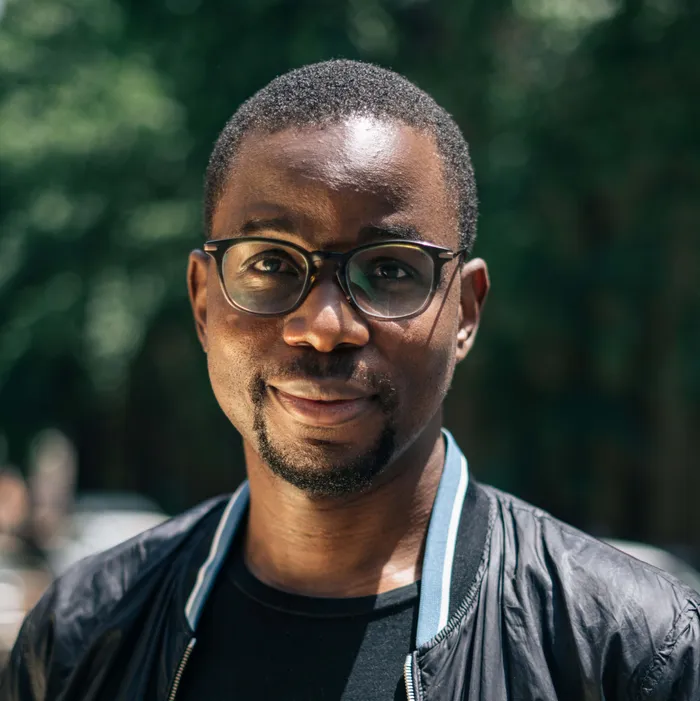
Two businessmen shaking hands. The writer askes, Five years into leading PAWA Africa, I'm forced to ask hard questions that make many in the ecosystem uncomfortable: Are we chasing the right kind of capital?
Image: Ketut Subiyanto/Pexels
As Japanese investment in Africa quietly doubles from 520 companies in 2010 to 972 by 2022, profound questions emerge about which African innovations successfully transcend borders and why others, equally promising, remain stubbornly local.
The answers point not to technological superiority or funding rounds, but to something far more fundamental.
From private sector to ecosystem builder and researcher, Johannesburg-based Tanzanian-Nigerian Alesimo Mwanga's trajectory through Africa's development landscape reflects a deep commitment to bridging innovation with tangible economic impact.
During our deep, in-trench collaboration on ecosystem engagement strategy and execution at 54 Collective, I witnessed firsthand her singular ability to distil complex innovation dynamics into actionable insight and delivery. Fittingly, this column arrives on PAWA Africa's fifth anniversary - a milestone worth celebrating.
Those familiar with her previous work at organisations like 22 ON SLOANE and her current role as chair of the Cape Peninsula University of Technology's Advisory Board will appreciate that in this Tech Tides Africa column hijack, she brings years of pattern recognition to bear on why certain African innovations find fertile ground abroad while others struggle to transcend geographical constraints.
Mwanga's insights. In her words:
Why do some African innovations successfully cross borders while others equally promising remain local? The answer lies not in technological superiority or funding size, but in something far more fundamental – strategic partnerships.
In my recent research with the Japanese External Trade Organisation (JETRO) Johannesburg, a striking pattern emerged: companies like VitruvianMD (expanding AI fertility diagnostics to the Middle East) and FloatPays (following TymeBank into the Philippines) share a common success factor. Meanwhile, innovative solutions like StokFella (digitalising South Africa's R50 billion stokvel economy) remain geographically constrained despite solving critical local problems.
What separates these groups isn't just superior technology or deeper funding pockets. It's their integration with institutional partners who smooth entry into new markets. VitruvianMD forged partnerships with global fertility networks while FloatPays integrated with TymeBank's infrastructure, riding established rails into new territories. By contrast, StokFella and Spaza Eats serve informal economic systems that are inherently local and fragmented, requiring painstaking market-by-market partnership building.
I've come to believe their path to international scale may ultimately depend less on additional venture funding and more on access to deals with institutions who already have multi-market presence. It's a connectivity gap that most founders underestimate until they hit the scaling wall.
For too long, discussions about Africa's digital economy have been mired in the tired "Africa rising" narrative – a simplistic framing that obscures the complex intersection where digital innovation meets tangible economic impact. Five years into leading PAWA Africa, I'm forced to ask hard questions that make many in the ecosystem uncomfortable: Are we chasing the right kind of capital? Have we been seduced by venture capital's siren song while neglecting more sustainable funding structures?
The current African tech funding landscape is dramatically imbalanced. Venture capital dominates at 68% of total funding, while patient capital (12%), grants (15%), and revenue-based financing (5%) play smaller roles.
Based on our analysis at PAWA Africa—examining funding data from 2018-2023 and interviewing over 30 founders—a healthier mix would reduce VC dependency to 40% whilst increasing patient capital to 25%, grants to 20%, and revenue-based financing to 15%.
The evidence is compelling: startups with this balanced approach demonstrated greater resilience during market volatility. I've watched too many promising ventures collapse when venture funding retreated during economic downturns – casualties of a funding model ill-suited to our continent's realities.
Let's be honest: we can't sustain an innovation ecosystem on hype-fuelled venture capital alone—especially if that capital retreats at the first sign of global turbulence. We need outcome-based thinking that celebrates revenue earned or communities served rather than glorifying fundraising announcements.
I've grown weary of celebrating oversubscribed funding rounds for startups that may never achieve profitability.
In my conversations with founders across the continent, I've found a growing appetite for co-development partnerships—pairing with large corporates to co-create solutions and instantly access ready markets.
This is a smarter play than simply banking a VC cheque and then struggling solo to acquire customers. A partnership can mean distribution networks, regulatory support, technical know-how, or an existing user base—all the things you can't buy off-the-shelf with funding.
I've seen firsthand how partnerships help startups scale beyond home borders in ways solo efforts cannot. Africa's markets are so fragmented that expanding from Nigeria to Kenya can be as challenging as entering South America. But with the right partner—a multinational with regional presence or a development agency with cross-border programmes—startups can leapfrog these barriers.
What fascinates me is that TymeBank's founders found it easier to expand into emerging Asian markets than into neighbouring African countries. It's a provocative truth: an African startup might find Vietnam more accessible than adjacent African countries due to regulatory complexity and fragmented markets.
For investors, I challenge you: don't just ask founders "How will you scale 10x?"—ask "Who will help you scale?" For policymakers, we desperately need platforms where startups connect with corporates.
I'm calling for industry-specific accelerators and pilot programmes linking tech companies with incumbents in telecom, banking, health, and agriculture.
Japan's engagement with Africa exemplifies the patient partnership approach I'm advocating. According to the JETRO Africa Business Survey 2022 and Japan Ministry of Foreign Affairs economic reports, their corporate presence has nearly doubled from 520 companies in 2010 to 972 by 2022.
What's remarkable isn't just growth but approach—Japanese investors typically prioritise quality, skills transfer and long-term value creation over rapid exits.
NTT's $3.2 billion acquisition of South Africa's Dimension Data demonstrates this commitment. Likewise, automotive giants like Toyota and Nissan have established manufacturing partnerships bringing skills transfer and supplier ecosystems. Japanese involvement is expanding into startups, with SoftBank's Vision Fund co-leading a $400M round in Nigeria's OPay and creating Africa-focused funds like Kepple Africa Ventures.
This patient capital model allows African startups breathing room to navigate regulatory complexities—precisely what's needed in our fragmented markets.
Looking ahead, I believe African tech is at an inflection point. To truly bridge tech innovation with real economic value, we must refocus on balanced funding sources, strategic partnerships, and patient global allies.
Success looks like farmers getting fair prices, patients receiving drone-delivered medicine, and young developers finding jobs because local startups grew into multinationals.
The next chapter of African innovation must be defined not by unicorn counts, but by value created for our people. That's beyond digital hype—it's the legacy we should all work towards.
Andile Masuku is Co-founder and Executive Producer at African Tech Roundup. Connect and engage with Andile on X (@MasukuAndile) and via LinkedIn.

Executive director of PAWA Africa Alesimo Mwanga advocates partnerships as key to scaling African innovation globally.
Image: supplied.

Andile Masuku is Co-founder and Executive Producer at African Tech Roundup.
Image: Supplied
BUSINESS REPORT